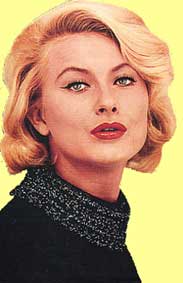The Swedish Final was held on March 2nd at the SVT TV Studios in Malmö, hosted by Eva Andersson. The 10 songs were reduced to 5 finalists, after which the winner was chosen by the votes of 9 juries, with each jury being split according to the age of its members.
In order to save money for the staging of the Eurovision Song Contest itself, the competition to select Sweden's national entry, Melodifestivalen, was a low-budget version in 1985.
Bra vibrationer, sung by Kikki Danielsson,written by Ingela Forsman and composed by Lasse Holm, won.
Results:
01. Bra vibrationer - Kikki Danielsson, 56 points
02. Ta min hand - Dan Tilberg, 49 points
03. Eld och lågor - Göran Folkestad, 35 points
04. Piccadilly Circus - Pernilla Wahlgren, 29 points
05. Jag vet hur det känns - Li Berg, 20 points
other participants:
Vänner - Susanne Frölén
Nu har det hänt igen - Ritz
Morgonluft - Per-Erik Hallin
1 + 1 = 2 - Bel Air
Sjung din sång - Stefan Borsch
For the final, in which Sweden performed in 16th position, the song's title was translated into Good Vibrations. It did very well in the voting and came third with 103 points, 20 points behind the winner.
***
Ann-Kristin Kikki Danielsson (born May 10 1952 in Osby, Sweden) is a Swedish country, dansband and pop singer. Sometimes, she also plays the accordion and she has also written some lyrics. She is also famous for yodeling in some songs. Kikki Danielsson gained her largest popularity in the Nordic region from the late 1970s until the late 1990s. She also gained popularity at the US country stage during the 1980s. In 1986, she had the Kikki i Nashville TV show.
Totally, she has participated nine times at the Swedish Melodifestivalen and one time at the Norwegian Melodi Grand Prix. She has participated in the Eurovision Song Contest twice, in 1982 (as a part of the Swedish pop and country group Chips with the song Dag efter dag, finishing 8th) and in the 1985 with the song Bra vibrationer, finishing 3rd.
Participations at Melodifestivalen:
1978: Miss Decibel (with Lasse Holm & Wizex), 2nd
1980: Mycke' mycke' mer (as a member of Chips), 4th
1981: God Morgon (as a member of Sweets 'n' Chips), 2nd
1982: Dag efter dag (as a member of Chips), 1st
1983: Varför är kärleken röd, 2nd
1985: Bra vibrationer, 1st
1992: En enda gång, 4th
2002: Vem é dé du vill ha (with Elisabeth Andreasson & Lotta Engberg), 3rd
2006: Idag & imorgon, 10th
Participation at Norwegian national final:
2003: Din hånd i min hånd (with Elisabeth Andreasson & Lotta Engberg), 4th
Kikki Danielsson was born in Osby, but was adopted and lived on a farm in Älmhult, Småland from the age of five. There, she became the only child in the family while her younger sister was adopted to another place. As a five-year-old girl, Kikki Danielsson made her first singing performance, which occurred at the local Sunday school's Lucia party in her Småland home church, singing the Christmas song När Jesusbarnet låg en gång. As a child, she sang in the local church choir.
As a 17-year old girl, Kikki Danielsson begun as a singer in dansband Nickies and in 1973 she switched to another dansband, Wizex, with which she participated at the Swedish Melodifestivalen 1978. She left Wizex in 1982, but as a member of the pop and country group Chips, she participated at the Swedish Melodifestivalen 1980, 1981 and 1982. She has also been a popular Svensktoppen artist, with hits as the Melodifestivalen songs, but also other songs, like Papaya Coconut in 1987. She willingly sings country and has contributed in radio and TV shows in the U.S. in the 1980s.
During the second half of 1984, she married Swedish musician Kjell Roos, who led the dansband Roosarna, with which she sang between 1990 and 1999. In 1985 she gave birth to their first child. In late 1987 she released the Christmas album Min barndoms jular. Together with Roosarna, she had many Svensktoppen hits during the 1990s. In 1994, the dansband of the year prize at the Grammis was awarded to Kikki Danielsson & Roosarna. In 1999 she separated from Kjell Roos. However, the musical co-operation re-started in 2003.
Kikki Danielsson has also sang at the 2001 Stockholm Pride. Together with Lotta Engberg and Elisabeth Andreasson she participated at the Swedish Melodifestivalen 2002, together they called themselves Kikki, Bergarn & Lotten, had an own dinner show during the second half of 2002 and participated at the Norwegian Melodi Grand Prix in 2003. They also started a successful collaboration with the Swedish brand "twilfit" designing stretchy yet fashionable t-shirts.
Kikki Danielsson participated at Melodifestivalen 2006 with the song I dag & i morgon, written by Thomas G:son and Calle Kindbom, which reached the final in the Stockholm Globe Arena, where it finished at the 10th and last place.
From November 28-December 17, 2006, she toured Sweden with a band on the Julstämning med Kikki Christmas concert tour.
Her periods of problems with alcohol have been a popular topic of the Scandinavian press, as has her weight problem. Because of her weight problem, she appeared in Du är vad du äter, the Swedish version of You are what you eat, in 2006 where she made great progress and lost several pounds.
In January 2010, it was announced that Kikki Danielsson together with Sören Sulo Karlsson and The Diamond Dogs would record the single Maybe I'll Do, and on July 13 2010 she appeared at Allsång på Skansen. On 13 April 2011 she released the album Första dagen på resten av mitt liv, where she worked together with Sören Sulo Karlsson.
In 2012 kikki Danielsson starred in the film Sean Banan inuti Seanafrika, the film was panned by critics.



















